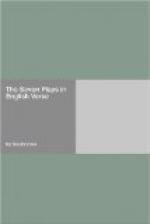LICH. An islander. I cannot trace her stock.
MESS. Look hither, man. Who is’t to whom thou speakest?
LICH. Why such a question? What is thine intent?
MESS. Nay, start not, but make answer if thou knowest.
LICH. To Deanira, Oeneus’ queenly child,
Heracles’ wife,—if these mine eyes
be true,—
My mistress.
MESS. Ay, that is the very word
I longed to hear thee speak. Thy mistress, sayest?
LICH. To whom I am bound.
MESS. Hold there! What
punishment
Wilt thou accept, if thou art found to be
Faithless to her?
LICH. I faithless! What dark
speech
Hast thou contrived?
MESS. Not I at all. ’Tis
thou
Dost wrap thy thoughts i’ the dark.
LICH. Well, I will
go.
’Tis folly to have heard thee for so long.
MESS. You go not till you answer one word more.
LICH. One, or a thousand! You’ll not stint, I see.
MESS. Thou knowest the captive maid thou leddest home?
LICH. I do. But wherefore ask?
MESS. Did you not say
That she, on whom you look with ignorant eye,
Was Iole, the daughter of the King,
Committed to your charge?
LICH. Where? Among whom?
What witness of such words will bear thee out?
MESS. Many and sound. A goodly company
In Trachis’ market-place heard thee speak this.
LICH. Ay.
I said ’twas rumoured. But I could not
give
My vague impression for advised report.
MESS. Impression, quotha! Did you not on
oath
Proclaim your captive for your master’s bride?
LICH. My master’s bride! Dear lady,
by the Gods,
Who is the stranger? for I know him not.
MESS. One who was present where he heard thee
tell,
How that whole city was subdued and taken,
Not for the bondage to the Lydian girl,
But through the longing passion for this maid.
LICH. Dear lady, let the fellow be removed.
To prate with madmen is mere foolishness.
DE. Nay, I entreat thee by His name, whose fire
Lightens down Oeta’s topmost glen, be not
A niggard of the truth. Thou tell’st thy
tale
To no weak woman, but to one who knows
Mankind are never constant to one joy.
Whoso would buffet Love, aspires in vain.
For Love leads even Immortals at his will,
And me. Then how not others, like to me?
’Twere madness, sure, in me to blame my lord
When this hath caught him, or the woman there,
His innocent accomplice in a thing,
No shame to either, and no harm to me.
It is not so. But if from him thou learnest
The lore of falsehood, it were best unlearnt;
Or if the instruction comes of thine own thought,
Such would-be kindness doth not prove thee kind.




